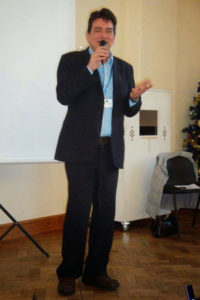In the fourth of our blogs for Action on Stroke month, Phil Collis, PPI Lead and “bloke with a stroke” shares his passion to ensure that the lived experience remains firmly at the heart of future stroke research and improvements in care.
A bloke with a stroke…
I became interested in health research following a subarachnoid haemorrhage (SAH) at the age of 17 which caused my stroke. I used to wheel my chair to the Teaching hospital library to learn what a SAH is, at the time due to my stroke I couldn’t pronounce it! I wanted to learn as much as possible in order to prepare myself for my future. I put research on the ‘back burner’ and during my recovery concentrated on developing community support for other young people and their carers who had been affected by stroke.
My involvement…
I was lucky enough to be employed in London’s East End to develop a stroke project which has been successfully running for over 15 years. Due to this work I was asked to join the All-Party Parliamentary Group for Stroke. This in turn led me to become a member of the Steering Group that developed the NHS England Stroke Strategy 2007-2017. It was at this point that I became a member of INVOLVE where I have a interest in Patient, Public and Carer Involvement. I am a strong believer in patient involvement in services and in becoming involved in Research Projects. I am a Patient Research Ambassador for the NIHR. I also work with NIHR dissemination Centre. I am also a member of NHS England ‘Specialised Commissioning’ CRG. I believe that being involved in research enables us to give personal perspective to research that has in the past often not been included. I think it is also important that research leads can include this perspective so that lived experience can be improved and patient knowledge can help recovery through better understanding and communication. Sharing clinical, medical and patient understanding of conditions in medical research encourages better delivery of patient care and recovery. In the past clinical/medical practice has been delivered without patient input and I am glad to see that patient participation in research and health delivery is improving the lives of everyone. Giving patient voice allows clinicians to understand the effects of research so that patients and clinicians can work better together to improve the lives of those affected. Patient, public and carer involvement benefits everyone and helps promote good practice and better outcomes for people whilst also highlighting areas where this does not happen. I live with the effects of my stroke and over the years have been involved in developing services for others ranging from personal chats with people affected by stroke on hospital wards and in the community to developing services locally, regionally and Nationally. I know the Stroke community well and strive to involve as many people as possible in highlighting the needs of people affected by stroke through research, participation, promotion and influencing. I have completed the European Patient Ambassador Programme. I have also completed the ‘Improving Clinical Research Course’ with Leeds University. I am also participating in the EURDIS programme (a European programme for rare conditions). I review service specifications for NHS England. I am involved with the NIHR reviewing funding applications for several programmes including MIC and i4i. I am also involved with both the BHF and Stroke Association as a member of their Patient Advisory Groups.
The importance of the lived experience
I am passionate about involving ‘lived experience’ in research. I would certainly encourage clinicians to promote patient involvement in all aspects of their services, including research. Patient perspective in planning services and research are so valuable. I believe that promoting patient involvement leads to successful improved services and research, so that everyone can benefit from improved health and social care outcomes.


